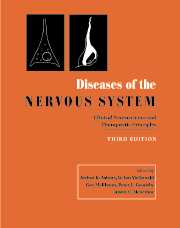Book contents
- Frontmatter
- Dedication
- Contents
- List of contributors
- Editor's preface
- PART I INTRODUCTION AND GENERAL PRINCIPLES
- PART II DISORDERS OF HIGHER FUNCTION
- 13 Congenital disorders of cerebral cortical development
- 14 The aging brain: morphology, imaging and function
- 15 Neurodegenerative diseases
- 16 Aging and dementia: principles, evaluation and diagnosis
- 17 Alzheimer's Disease
- 18 Dementia with Lewy bodies
- 19 Frontotemporal dementia
- 20 Consciousness and its disorders
- 21 Mechanisms of memory and amnestic syndromes
- 22 Acquired disorders of language
- 23 Neglect
- 24 Brain death
- 25 Disorders of mood
- 26 Schizophrenia
- 27 Obsessive–compulsive disorder
- 28 Autism and autistic spectrum disorders
- 29 Attention deficit hyperactivity disorder: spectrum and mechanisms
- 30 The neurobiology of drug addition
- PART III DISORDERS OF MOTOR CONTROL
- PART IV DISORDERS OF THE SPECIAL SENSES
- PART V DISORDERS OF SPINE AND SPINAL CORD
- PART VI DISORDERS OF BODY FUNCTION
- PART VII HEADACHE AND PAIN
- PART VIII NEUROMUSCULAR DISORDERS
- PART IX EPILEPSY
- PART X CEREBROVASCULAR DISORDERS
- PART XI NEOPLASTIC DISORDERS
- PART XII AUTOIMMUNE DISORDERS
- PART XIII DISORDERS OF MYELIN
- PART XIV INFECTIONS
- PART XV TRAUMA AND TOXIC DISORDERS
- PART XVI DEGENERATIVE DISORDERS
- PART XVII NEUROLOGICAL MANIFESTATIONS OF SYSTEMIC CONDITIONS
- Complete two-volume index
- Plate Section
15 - Neurodegenerative diseases
from PART II - DISORDERS OF HIGHER FUNCTION
Published online by Cambridge University Press: 05 August 2016
- Frontmatter
- Dedication
- Contents
- List of contributors
- Editor's preface
- PART I INTRODUCTION AND GENERAL PRINCIPLES
- PART II DISORDERS OF HIGHER FUNCTION
- 13 Congenital disorders of cerebral cortical development
- 14 The aging brain: morphology, imaging and function
- 15 Neurodegenerative diseases
- 16 Aging and dementia: principles, evaluation and diagnosis
- 17 Alzheimer's Disease
- 18 Dementia with Lewy bodies
- 19 Frontotemporal dementia
- 20 Consciousness and its disorders
- 21 Mechanisms of memory and amnestic syndromes
- 22 Acquired disorders of language
- 23 Neglect
- 24 Brain death
- 25 Disorders of mood
- 26 Schizophrenia
- 27 Obsessive–compulsive disorder
- 28 Autism and autistic spectrum disorders
- 29 Attention deficit hyperactivity disorder: spectrum and mechanisms
- 30 The neurobiology of drug addition
- PART III DISORDERS OF MOTOR CONTROL
- PART IV DISORDERS OF THE SPECIAL SENSES
- PART V DISORDERS OF SPINE AND SPINAL CORD
- PART VI DISORDERS OF BODY FUNCTION
- PART VII HEADACHE AND PAIN
- PART VIII NEUROMUSCULAR DISORDERS
- PART IX EPILEPSY
- PART X CEREBROVASCULAR DISORDERS
- PART XI NEOPLASTIC DISORDERS
- PART XII AUTOIMMUNE DISORDERS
- PART XIII DISORDERS OF MYELIN
- PART XIV INFECTIONS
- PART XV TRAUMA AND TOXIC DISORDERS
- PART XVI DEGENERATIVE DISORDERS
- PART XVII NEUROLOGICAL MANIFESTATIONS OF SYSTEMIC CONDITIONS
- Complete two-volume index
- Plate Section
Summary
Twenty-five years ago, there was little understanding of the causes of neurodegeneration. In fact, the term degenerative disease was used as a wastebasket for illnesses of unknown etiology. But progress over the past quarter of a century in research focused on degenerative disorders of the central nervous system (CNS) has been impressive. It is now clear that neurodegenerative diseases are caused by the misprocessing of proteins. In each disease, one or more specific proteins have been identified that are misprocessed; this results in the accumulation of one or more particular proteins.
The proteins that accumulate in the CNS of patients with neurodegenerative diseases were initially identified by purifying these polypeptides from the brains of animals or humans with these diseases (Glenner & Wong, 1984; Masters et al., 1985; Prusiner et al., 1982). Subsequently, molecular genetics was used to identify the genes responsible for the familial forms of Alzheimer's and Parkinson's diseases as well as amyotrophic lateral sclerosis (ALS) and frontotemporal dementia (FTD). Similarly, molecular genetic investigations of Huntington's disease (HD) and the spinocerebellar ataxias have led to the identification of the genes responsible for the pathogenesis of these illnesses.
Of all the studies on neurodegenerative diseases, the discovery of prions has been most unexpected. The finding that a protein can act as an infectious pathogen and cause degeneration of the CNS was unprecedented (Prusiner, 1998b). The prion concept was so novel that achieving acceptance required a long and arduous battle (Prusiner, 1999). The prion concept not only explained how a disease can be both infectious and genetic, but it has also created new disease paradigms and revolutionized thinking in biology.
Although progress in the study of neurodegeneration has been impressive, there are still no curative treatments.Only for patients with Parkinson's disease is there a palliative drug with reasonable efficacy (Cotzias et al., 1967). L-dopa and related drugs do not stop the underlying degeneration, which often renders patients refractory to pharmacologic treatment in the later stages of Parkinson's disease (Marsden & Parkes, 1977). Stereotactic surgery has produced limited success in ameliorating the symptoms of Parkinson's disease when L-dopa becomes ineffective. Transplantation of cells secreting dopamine into the brains of patients with advanced Parkinson's disease is the subject of much research. It is noteworthy that many patients with Parkinson's disease develop dementia in the later stages of this disorder.
- Type
- Chapter
- Information
- Diseases of the Nervous SystemClinical Neuroscience and Therapeutic Principles, pp. 210 - 236Publisher: Cambridge University PressPrint publication year: 2002
- 3
- Cited by

